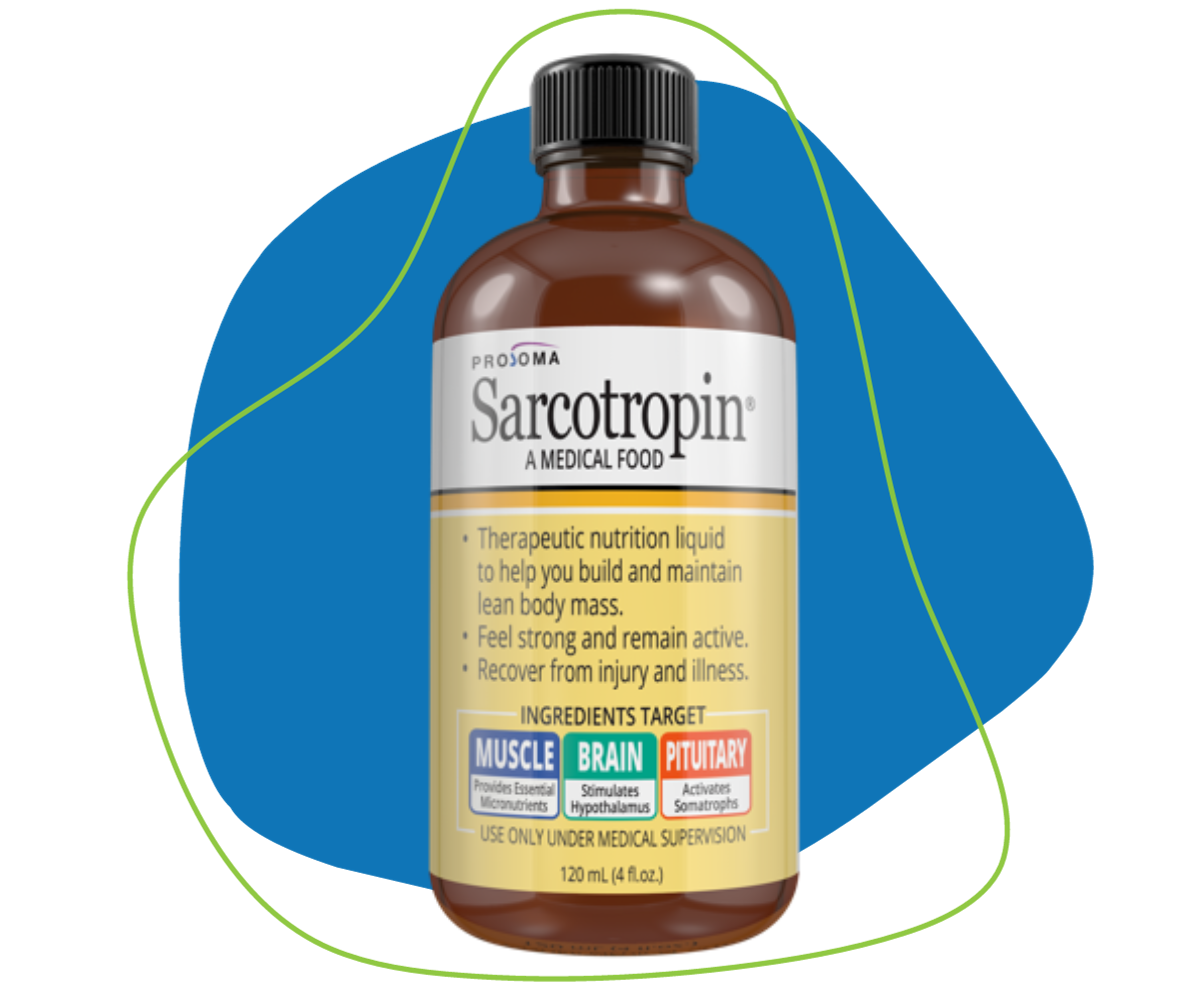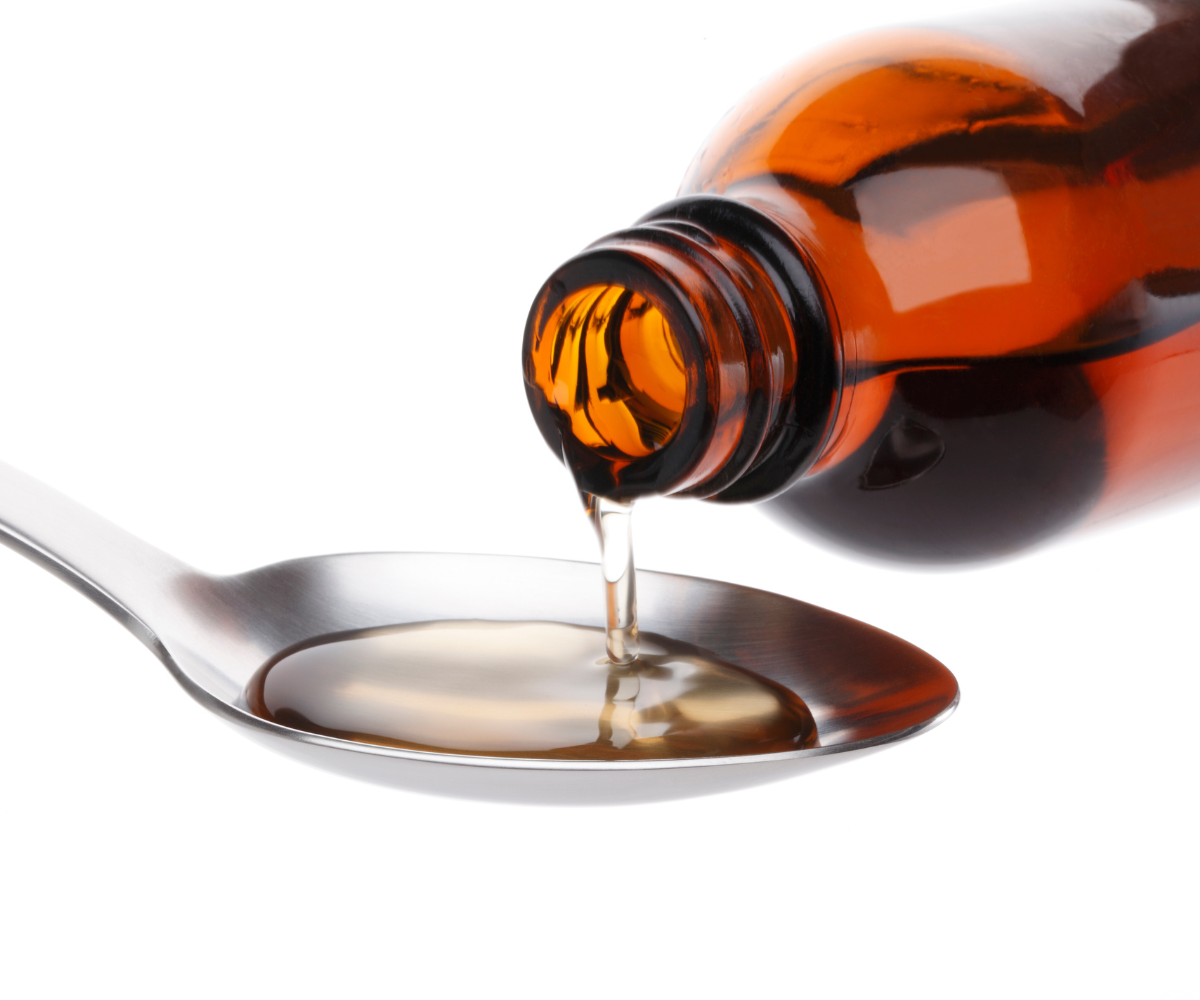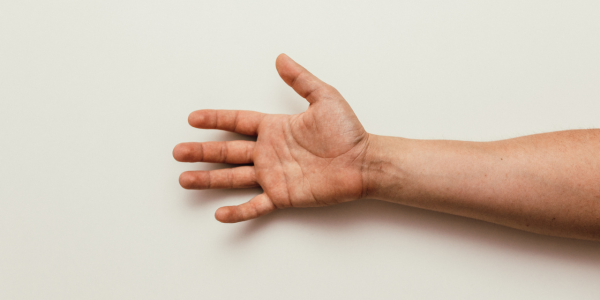
What is Sarcotropin?

Sarcotropin is a liquid supplement that aims to boost Human Growth Hormone (hGH) levels to combat sarcopenia, or age-related decreases in strength and muscle mass.
The blend of ingredients in Sarcotropin is designed to help stimulate the pituitary gland to produce more hGH. Sarcotropin also includes ingredients designed to improve cognition, provide energy, boost mood, and other benefits.
This therapy can be milder than utilizing secretagogues like Sermorelin, which may be preferable for some patients.
Ingredients in Sarcotropin
Sarcotropin includes a variety of ingredients designed to naturally support hGH production, along with other benefits.
Sarcotyn™ Blend – This proprietary blend is designed to stimulate the pituitary gland and raise hGH levels naturally.
Alpha-GPC (alphaglycerylphoshorylcholine) — This compound is made from choline and shows promise in increasing acetylcholine in the brain, leading to increased memory and learning.
L-Leucine – As a branched chain amino acid (BCAA), L-Leucine may help increase Human Growth Hormone production, which can lead to better body composition, more muscle growth, and more.
L-Arginine – This amino acid aids in the creation of protein, which in turn impacts body composition. L-Arginine also improves blood flow which can have a positive impact on blood pressure.
L-Pyroglutamic Acid – This acid aids in the production of neurotransmitters, which may help with cognition, mood, memory, and more.
GABA (gamma-aminobutyric acid) — GABA is a neurotransmitter that reduces synaptic activity for a calming effect. It may help improve sleep and reduce anxiety.
DMAE (dimethyl-aminoethanol) – This compound may increase acetylcholine production, which helps with brain function.
Mucuna pruriens (velvet bean extract) – This natural extract has high levels of L-DOPA, which is an amino acid that converts to dopamine in the brain. L-DOPA may have positive effects on cognition, brain function, and mood.
Menaquinone-7 (Vitamin K2-mk7) – This natural vitamin may help support heart health, improve immunity, promote bone health, and more.
Vitamin D3 (Cholecalciferol) – Vitamin D3 is responsible for maintaining calcium and phosphate levels. It also supports bone health, immune function, and more.
Prunus domestica (Rosaceae plum juice) – Plum juice provides a natural source of ghrelin, a hormone produced by the stomach that triggers hunger cues. It also provides a natural source of fiber and can support the digestive process.

Sarcotropin Dosage Instructions
Sarcotropin is available in liquid form, and the standard dosage is 4 mL daily. Because the ingredients can trigger relaxation, it’s recommended to take Sarcotropin at night.
Sarcotropin comes in a 120 mL vial with approximately 30 doses.
What is Human Growth Hormone?
Human Growth Hormone (hGH) is important for many bodily functions.
HGH helps us heal and recover quickly, keeps our body composition healthy, creates new cells, and is responsible for growth.
During teen years, hGH levels are at their highest, which helps us develop into adults. But over time, hGH levels decrease until they’re about one-tenth of what they were by the time we’re in our 50s.
This decrease can cause issues like fat gain; difficulty building muscle; and slowed healing and recovery after exercise, injury, or medical procedures. Low hGH levels due to certain medical conditions can also have a negative effect on health overall.
Are There Other Therapies to Increase hGH?
Sarcotropin is a supplement derived from natural ingredients that aims to support the body’s production of hGH.
Patients may prefer Sarcotropin over stronger prescription medications that impact hGH levels directly. Sarcotropin is typically less expensive, and is often available in states that have stricter medical regulations.
But there are other hGH therapies that trigger the release o hGH, which can offer more potent results.
Sermorelin for Human Growth Restoration
Sermorelin is a prescription medication that functions as a Human Growth Hormone (hGH) secretagogue. That means it triggers the body’s natural secretion of hGH. It can be used as part of a Growth Hormone Restoration treatment program to optimize hGH levels.
HGH can decrease for many reasons, including aging, issues with the pituitary gland or hypothalamus, and certain diseases.
Sermorelin is delivered via subcutaneous injection into the fatty layer of the skin. Injections are typically administered by the patient.

Human Growth Restoration with Defy Medical
Defy Medical can help you address falling hGH levels.
We offer therapies to address hGH decline, and our services are conveniently available via telemedicine. Supplements and medications (if prescribed) can be ordered online with doorstep delivery.
You don’t have to accept the effects of aging—treatments like Sarcotropin and Sermorelin may help.
Ready to learn more?
Get StartedScientific Sources
1. Warrington, Nicole M et al. “Genome-wide association study identifies nine novel loci for 2D:4D finger ratio, a putative retrospective biomarker of testosterone exposure in utero.” Human molecular genetics 27,11 (2018): 2025-2038. doi:10.1093/hmg/ddy121. https://www.ncbi.nlm.nih.gov/pmc/articles/PMC5961159
2. Parkin Kullmann, Jane Alana, and Roger Pamphlett. “Does the index-to-ring finger length ratio (2D:4D) differ in amyotrophic lateral sclerosis (ALS)? Results from an international online case-control study.” BMJ open 7,8 e016924. 7 Aug. 2017, doi:10.1136/bmjopen-2017-016924. https://www.ncbi.nlm.nih.gov/pmc/articles/PMC5726056/
3. Abbott, Andrew D et al. “Early-to-mid gestation fetal testosterone increases right hand 2D:4D finger length ratio in polycystic ovary syndrome-like monkeys.” PloS one vol. 7,8 (2012): e42372. doi:10.1371/journal.pone.0042372. https://www.ncbi.nlm.n ih.gov/pmc/articles/PMC3425513
4. Bailey AA, Hurd PL. Finger length ratio (2D:4D) correlates with physical aggression in men but not in women. Biol Psychol. 2005 Mar;68(3):215-22. doi: 10.1016/j.biopsycho.2004.05.001. PMID: 15620791. https://pubmed.ncbi.nlm.nih.gov/15620791/


